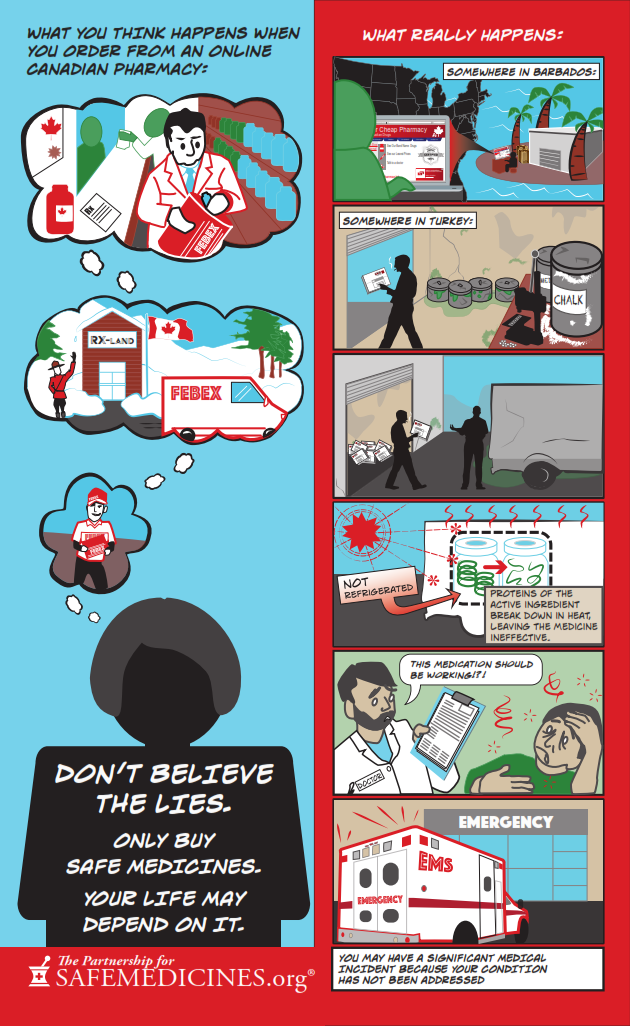FDA Sends Warning Letters To Unlicensed Online Pharmacies Selling Unapproved and Misbranded Medications
The U.S. Food and Drug Administration (FDA) announced their participation in the tenth annual Operation Pangea, an international week-long action organized by Interpol that works to tackle the sale of counterfeit and illicit medicines online. The Washington Post reported that this year’s action from September 12 to 19 involved 197 police, customs, and health regulatory officials from 123 countries, led to 400 arrests worldwide and the seizure of more than $51million worth of dangerous medicines.
One of the FDA’s primary goals for the week was to take action against more than 500 websites that illegally sold unapproved and potentially dangerous versions of prescription drugs to American consumers, including antibiotics, opioids, and injectable epinephrine. The FDA issued warning letters to the operators of most of the illegal websites and confiscated nearly 100 websites with names such as buyhydrocodoneonline.com, canadian-pharmacy24x7.com, and buyklonopin.com.
The letters were issued to online pharmacy affiliate programs, which are business enterprises utilizing a variety of websites to sell to patients as if they were all independent pharmacies, but are instead front organizations for the same mass unapproved drug seller. As well as using a variety of websites as front “stores” the affiliate programs also use botnets to send mass emails. One of the programs addressed in the letters, GlavMed, is a notorious affiliate network associated with the Win32.Kelihos.b trojan, which was used to distribute spam via unsuspecting infected computers. In addition to being a business that promotes itself by a infecting computer, according to the New York Times, GlavMed is also infamous for its suspected founder, Igor Gusev, who allegedly operated a sister entity, SpamIt.com, which “directed traffic to various sites operating under the name Canadian Pharmacy.”
The New York Times reported in 2010, that computer security researchers “conjectured that spamming gangs have sometimes been co-opted by the intelligence agencies in Russia, which provide cover for the spamming activities in exchange for the criminals’ expertise or for allowing their networks of virus-infected computers to be used for political purposes — to crash dissident Web sites, for example, or to foster attacks on foreign adversaries.”
The FDA’s letter to GlavMed listed 29 websites operated by them that were selling unapproved or misbranded drugs. Examples cited in the letter were the sale of oral chloramphenicol, a drug that was pulled from the U.S. market due to serious and potentially life-threatening side effects, and roxithromycin, which the website stated could be “used for treating several different infections, including some STDs, upper and lower respiratory tract infections and asthma, gum infections like gingivitis, and bacterial infections associated with stomach and intestinal ulcers.” Roxithromycin is not nor has it ever been approved for any of these treatment uses.
FDA Commissioner Scott Gottlieb, M.D. said, “These rogue online pharmacies are often run by sophisticated criminal networks that knowingly and unlawfully distribute illicit drugs, including counterfeit medicines and controlled substances. Consumers go to these websites believing that they are buying safe and effective medications, but they are being deceived and put at risk by individuals who put financial gains above patient safety.” On top of health risks, illegal online pharmacies can expose consumers to financial risks such as credit card fraud and identity. The FDA encourages consumers to report suspected criminal activity to the FDA’s Office of Criminal Investigation.
The FDA and other federal agencies collaborated in screening packages at International Mail Facilities (IMG) in Chicago, Miami, and New York for illegal drug products. Nearly 500 packages were detained for follow-up. Packages found to be in violation of the Federal Food, Drug, and Cosmetic Act will be refused entry into the country. Commissioner Gottlieb said the FDA was proud to be part of the operation, but that there is still much work to do. “In addition to the multifaceted work plan we will soon unveil, we’ve recently tripled the staff we have in the IMFs to improve our ability to inspect packages that are suspected of containing illegal drugs, and we have doubled the number of cybercrime and port of entry special agents for the Office of Criminal Investigations. These efforts are part of a much broader work plan that the FDA is developing aimed at beefing up our efforts to interdict illegal drugs.”
